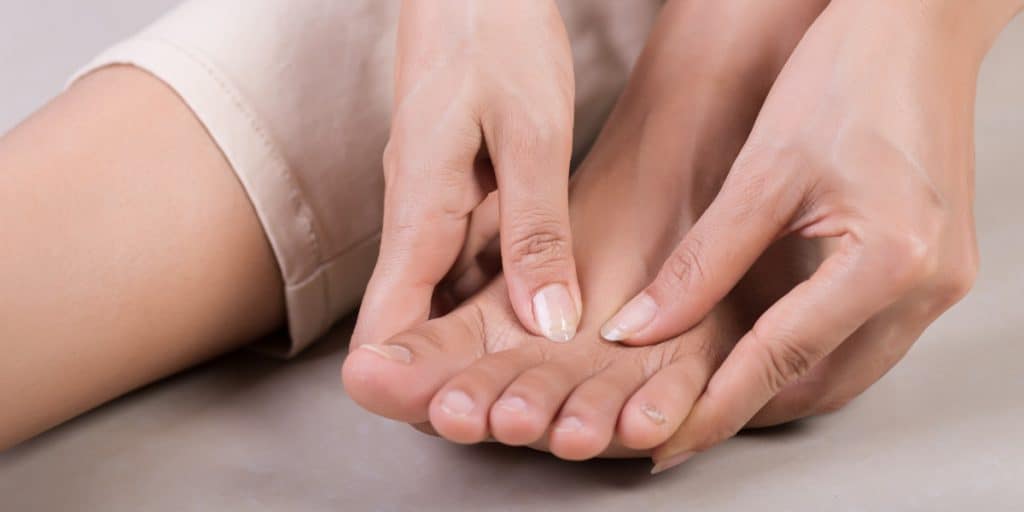Toes are small but have a big job — they share in the weight bearing of the body every day. That’s a lot of wear and tear. With all that stress on them, it’s no wonder toes are so prone to cramping.
What causes toe cramps?
The American Academy of Orthopaedic Surgeons defines a muscle cramp as an involuntary and sudden contraction of the muscle that doesn’t relax. Toe cramps can last from a few seconds to a few minutes. Anyone who has experienced a toe cramp can attest to how painful they are.
Muscle contractions in the toes can be related to issues in the legs, feet, or ankles.
There are many reasons toe cramps occur. Some are harmless and can be treated with at-home remedies. Others are caused by underlying medical conditions involving the circulatory or central nervous system, and rare infections.

The common reasons for toe cramps include:
Tight muscles
If muscles are tight or weak, painful toe curling and cramps occur more often. Tight or weak muscles are prone to injury.
Toe spasms can also be the result of muscle contractions in the feet or legs. A toe cramp may stem from contractions of leg muscles that extend into the feet and toes. It may also stem from a contraction of muscles in the feet that insert onto the toes.
Muscle strain/injury/overuse
An injury like an ankle sprain can cause spasms and pain in the entire foot (including the toes).
Research has linked overexertion to frequent toe cramps. There is still some uncertainty about why it affects some people and not others. But overuse is widely recognized as one of the most common causes of muscle cramps.

Ill-fitting footwear
High heels, tight and loose-fitting shoes, and pointy-toed shoes can place pressure on the toes and feet.
This pressure can cause severe toe cramps — especially if it forces the toes into an awkward position. Ill-fitting shoes can also cause muscle injuries. Having the right shoes is important for foot health — a supportive shoe that provides comfort for all activities. This helps alleviate painful toe cramps.
Dehydration and decreased electrolyte levels
Toe cramps can be triggered by dehydration and an electrolyte imbalance (electrolytes include: potassium, calcium, and magnesium). Sweating during exercise causes a loss of electrolytes and water that are required for muscles to function properly. Some medications, such as diuretics, also cause the body to lose minerals. These deficiencies can cause muscle spasms.
Electrolytes and proper hydration are important for muscle and nerve function and the maintenance of healthy blood pressure. Drinking enough water and maintaining the body’s electrolyte balance during intense exercise can decrease the chances of toe spasms.
Nerve damage
Peripheral neuropathy is a disorder of the peripheral nerves (nerves outside the brain and spine). This condition can cause pain, cramps, tingling, or numbness in the toes and feet.
Uncontrolled diabetes is a common cause of peripheral neuropathy. People with diabetic neuropathy experience toe cramps, pain and numbness, muscle spasms, and sores on the feet and toes. Health conditions such as Parkinson’s disease and multiple sclerosis can also cause nerve damage.
Poor blood flow
Poor circulation to the feet can be caused by medical conditions like diabetes and peripheral artery disease. Decreased blood flow to the feet and toes can cause spasms and pain.
Lack of blood flow leads to decreased oxygenation of the tissue, causing muscle cramps.
Lack of exercise
Regular exercise keeps the muscles, nerves, and joints healthy; exercising helps the feet and toes maintain their strength and flexibility. A sedentary lifestyle can lead to muscle weakness and weight gain, making a person vulnerable to toe cramps.
Aging
Muscle spasms and cramping become more common as we age due to decreased functioning in the nervous and musculoskeletal systems. This can cause muscle contractions and tightness in the feet and toes. Generally, it is harmless.
Other health conditions that cause cramping
Other health conditions that cause feet and toe cramps include:
- thyroid disorder
- pregnancy (during the third trimester)
- chronic kidney disease
- vitamin D deficiency
- dystonia
Although the exact cause of toe cramps is unknown some researchers believe inadequate stretching and muscle fatigue lead to abnormalities in the bodily processes that control muscle contraction.
What is dystonia of the feet?
Dystonia is a movement disorder that causes the muscles of the feet and toes to contract involuntarily. It causes repetitive or twisting movements.
Dystonia can affect different areas of the body or the entire body. Toe and foot cramps from dystonia can range from mild to severe and can interfere with the performance of daily tasks.
Dystonia is a common early symptom of young onset Parkinson’s disease, but it can appear during any stage. Focal dystonia is also seen in Multiple sclerosis.
Can dystonia be cured? No, but symptoms can be managed. Toe dystonia treatment includes medication and therapy.
How can I get rid of toe cramps and curling?
A study published in the Family Practice journal suggests that people with toe and leg cramping try some home treatments for their condition.
The DIY treatments to get rid of toe cramps include:
- Drink plenty of water to remain hydrated and maintain electrolyte balance.
- Applying heat with a heating pad or warm water bottle can help relax muscles, improve blood flow, and reduce pain.
- Stretching exercises are one of the best, short-term treatments for foot and toe cramps. Gentle stretching when the cramp happens helps alleviate symptoms immediately. Regular stretching acts as a preventative so cramps are less frequent, if at all.
- Massaging the affected area relaxes the muscles, alleviating the foot cramp. Massage works by increasing circulation to the muscles which increases blood flow and oxygen to the area.
- Wear shoes that fit properly.
- Exercise to keep the muscles, joints, tendons, and nerves all working properly.
- Eat a healthy diet that provides the body with the proper nutrients and electrolytes to maintain healthy functioning.
- Speak to your doctor or pharmacist about the medicine you’re taking as toe cramps may be a side effect. Your doctor can adjust the dosage to provide relief.
While toe cramps and spasms may not be a major cause for concern, seek medical advice from a podiatrist at University Foot & Ankle Institute if they happen frequently or are negatively impacting your life.
Why choose University Foot & Ankle Institute of Los Angeles for your foot and ankle care?
Whether you need to find proper footwear, treat an injury, or get advice on proper foot care, we’re here to help. Our podiatrists offer the most advanced podiatry care and the highest success rates in the nation. We are nationally recognized foot and ankle specialists and leaders in researching, diagnosing, and treating all foot and ankle conditions and common injuries.
For a free consultation please call (877) 736-6001 or make an appointment online now.
University Foot and Ankle Institute is conveniently located throughout Southern California and the Los Angeles area. Our foot and ankle surgeons are available at locations in or near Santa Monica, Beverly Hills, West Los Angeles, Sherman Oaks, the San Fernando Valley, El Segundo, the South Bay, LAX, Calabasas, Agoura Hills, Westlake Village, Valencia, Santa Clarita, and Santa Barbara.
- Do Blood Pressure Medicines Cause Foot Pain? - July 22, 2024
- What Is Erythromelalgia? - June 4, 2024
- Struggling with Toe Cramping and Curling? Here’s What To Do! - May 5, 2023
Leave a Reply